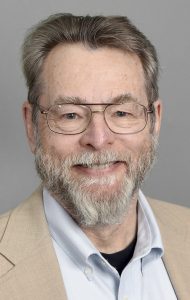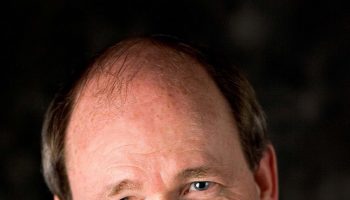To Braden Allenby, people are information-processing mechanisms — and when that mechanism is overloaded, the society they live in risks collapse.

At 3:30 p.m. EDT Monday, Aug. 17, on the CHQ Assembly Video Platform, Allenby — President’s Professor and Lincoln Professor of Engineering and Ethics at Arizona State University — will present “Information Technology and the Fall of the American Republic” as part of the Lincoln Applied Ethics Series. This presentation will cover how the ever-growing digital information-scape may danger American democracy.
For its history, the United States has operated on the idea of pluralism — in which an array of viewpoints are woven together and compromise is found in legislation. Allenby said that pluralism thrives in complexity — until a certain point.
“If things get too complex and if people begin to lose the ability to process information effectively because there’s too much of it, then what you end up with is political failure. That’s kind of what we’re seeing today in the United States,” Allenby said, “when information gets too complicated and (the information processing system) breaks down. You can see that in our politics: Information has gotten so complicated that many people are unable to tell the difference between the statement of fact, and fairly strange conspiracy theories.”
Because people are overloaded with information as it is increasingly available at their fingertips, Allenby said many cling to certain narratives — sometimes dangerous and incorrect.
In 2016, a man inspired by misinformation shared by InfoWars host Alex Jones attacked a Washington D.C. pizza restaurant that he believed harbored an underground pedophile ring orchestrated by former Secretary of State Hillary Clinton. The theory was proven wrong and the gunman was arrested. The incident has since been dubbed “Pizzagate.”
“That individual believed (the conspiracy theory), and he believed it enough to come up with a gun and start shooting up the place,” Allenby said. “The reason they believed it was that if you don’t have the ability to handle everything that our society is throwing at you, you fall back on your core narrative, your core belief system. And anything that fits with that, you’re going to believe whether or not it actually makes sense.”
Allenby also noted the “chemtrail” conspiracy theory that suggests the white trails of vapor left in the sky by passing airplanes are actually clouds of chemicals released in the air to control the population or manipulate the weather. Typically, theorists believe that this is a government-driven secret mission against average people.
“The chemtrail conspiracy theory means that you’ve got to believe that there are tens of thousands of people in national labs and in the government all keeping this amazing secret, when we can’t even keep NSA secrets safe,” Allenby said. “So, it’s a stretch.”
But, Allenby said that theorists do not turn to these stories for their believability, but for their moral comfort.
“(People) believe (a conspiracy theory) because it fits with their worldview. Their worldview is what they are sort of pushed into by the complexity of the world,” Allenby said. “And because they can’t go out and think about every single fact, what they do is take the position of trusted media, trusted friends, and that becomes the way they view the world.”
The internet poses more threats than just an overload of information, according to Allenby. The idea of free speech has shifted since the rise of social media. Now, the average person speaks out on social media if they want their voice heard.
“If you want to know where speech is today — it’s in the discussions about Facebook, Twitter and YouTube. Because, if you can’t get on social media, you can scream all you want in your yard, nobody’s going to hear you. The way you get heard is you get on social media,” Allenby said. “So, when Twitter kicks you off Twitter, that’s a big deal — not because you care so much about Twitter, but because now you no longer have speech in today’s media environment.”
With this shift in public discussion, the regulation of ideas and public discussion has shifted, too. Allenby believes it is something to worry about.
“A lot of people are arguing about freedom of speech in terms of, ‘Should people be allowed to promulgate clearly dangerous conspiracy theories that might encourage violence?’ That kind of argument (is one) we are having at a national level, but we’re not asking whether or not free speech as a government concept even exists anymore,” Allenby said. “Our entire idea of free speech has gone from being something that the government assures us is protected, as far as the government goes, to being a matter of the terms and conditions of social media companies. Free speech has been privatized, and nobody really notices.”
This series is funded by the David and Joan Lincoln Family Fund for Applied Ethics.




